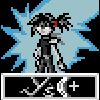As you figured out correctly, C++ is not a good language for a beginner. I'd suggest starting with C first. C++ is a superset of C and has many implementations and exceptions that just confuse you (you need some experience to know when to apply what and how). Also having a solid understanding of C is a very rewarding skill that many programmers nowadays lack.
I started with C++ when I was 13 (only language I knew before that was BASIC), though, I agree with Bjarne's comment in why not to learn C first in his new edition of Programming Principles and Practices Using C++, but I've also seen it paraphrased and restated by tons of other programmers across the internet.
"C first": This approach to learning C++ is wasteful of students' time and leads to poor programming practices by forcing students to approach problems with fewer facilities, techniques, and libraries than necessary. C++ provides stronger type checking than C, a standard library with better support for novices, and exceptions for handling errors.
Even self-taught programmers are still students of the language. If you want to learn C++, then learn C++. I've been programming for almost 20 years (started when I was 13 and will be 33 this year) now and my flaw was that I never went to an actual programming course to learn how to go from concept/idea to code so for 20 years I've been brute forcing my ideas into code (a method that does not work very well). When I brought this up, the advice was always one of these two answers "go to Project Euler and do their problems, that will help you" or "learn another language, seeing how they do it differently will help you". I listened to them and in 20 years I have dabbled in C, C#, Java, D, Assembler, Ada, Pascal, Fortran, COBOL, Ruby, Python, Perl, Lua, and even learned web site languages like PHP, Javascript, CSS, XML, HTML, and databasing with MySQL. It wasn't until I built up the courage to email Stroustrup that he helped me figure out my problem and helped me fix it.
The three important things I've learned in all my time doing that is this:
1) Learn the language you want, not a language someone recommends (because usually learning a new language gives you new obstacles to work around and some understanding, but will leave you likely stuck figuring out the original obstacle when you go back to the original language).
2) Only learn other languages if they will benefit your current project (or you are learning it because you enjoy learning them and are fascinated by them, which is why I listened to all the bad advice of learning other languages to solve my problem that ultimately showed up in every language because I loved the languages).
3) Self motivation, programming requires you to self motivate a lot in order to start, keeping going, and finish anything you do.
One last thing I want to point out (just in case you are suffering from it), a huge misconception people seem to have is that books and tutorials about a certain language will teach them to program (they won't and don't). Those books and tutorials only focus on the language and offer example programs to show the feature it is trying to explain, but not programming itself. I would say to get Programming Principles and Practices Using C++ Second Edition by Bjarne Stroustrup to learn programming (as it covers C++11 and C++14) and then when you are done with it consider getting his The C++ Programming Language Fourth Edition as a reference book. You can certainly use another C++11 compliant beginner book if you like. You can learn any language you like, but as I stated above, if you want to learn C++ then learn C++, but do it properly and wisely as there are tons of bad books out there claiming to teach C++.
I also don't 100% agree with learning SFML/SDL/Allegro on top of learning C++. C++ has enough of its own API that said books have you learn and you don't need the stress of learning both the C++ APIs while learning another libraries API on top of it. Although, like I stated before, do what you want and not what someone recommends because those recommendations are usually based off their experiences (as is all the above advice). In the end, decide what you want and do it, simple as that.










